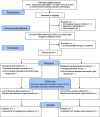Weight loss before total joint arthroplasty using a remote dietitian and mobile app: study protocol for a multicenter randomized, controlled trial
- PMID: 33187535
- PMCID: PMC7662734
- DOI: 10.1186/s13018-020-02059-w
Weight loss before total joint arthroplasty using a remote dietitian and mobile app: study protocol for a multicenter randomized, controlled trial
Abstract
Background: The months prior to elective surgery may present an opportunity for patients to initiate behavior changes that will simultaneously ready them for surgery and improve their overall health status. An upcoming elective total joint arthroplasty (TJA) may serve as motivation for patients with severe obesity (body mass index [BMI]> 40 kg/m2) to lose weight, as it may optimize clinical outcomes following TJA and help them become eligible for TJA since some surgeons use a BMI of 40 kg/m2 as a cut-off for offering surgery in an effort to optimize outcomes.
Methods: The purpose of this multicenter randomized, controlled trial is to assess the feasibility and efficacy of a 12-week remote dietitian (RD) supervised dietary and physical activity weight loss intervention and mobile app for 60 patients with severe obesity prior to undergoing TJA. Intervention participants will receive access to a smartphone app and connect with an RD who will contact these participants weekly or bi-weekly via video calls for up to nine video calls. Together, participants and RDs will set goals for lifestyle modifications, and RDs will check on progress towards achieving these goals using in-app tools such as food logs and text messages between video calls. All patients will be encouraged to lose at least 20 pounds with a goal BMI < 40 kg/m2 after 12 weeks. Individuals randomized to the control group will receive clinical standard of care, such as nutritionist and/or physical therapy referrals. Outcome and demographic data will be collected from blood serology, chart review, mobile app user data, pre- and postintervention surveys, and phone interviews. The primary outcome measure will be weight change from baseline. Secondary outcome measures will include percentage of patients eligible to undergo TJA, number of sessions completed with dietitians, self-reported global health status (PROMIS Global Health scale), self-reported joint-specific pain and function (Knee injury and Osteoarthritis Outcome Score (KOOS) or Hip disability and Osteoarthritis Outcome Score (HOOS)), and serologies such as hemoglobin A1c, total lymphocyte count, albumin, and transferrin. Qualitative responses transcribed from phone interviews about the intervention will also be analyzed.
Discussion: This will be the first study to assess pre-operative weight loss in patients with severe obesity anticipating orthopaedic surgery using an RD and mobile app intervention aimed at helping patients become eligible for TJA.
Trial registration: Registered on 1 April 2020 at Clincialtrials.gov. Trial number is NCT04330391 .
Keywords: Arthroplasty; Dietitian; Knee osteoarthritis; Mobile applications; Multicenter Study; Nutritionists; Obesity; Obesity, Morbid; Osteoarthritis, Hip; Preoperative Period; Randomized Controlled Trial; Smartphone; Telemedicine; Weight loss.
Conflict of interest statement
The authors declare that they have no competing interests.
Figures
Similar articles
-
Weight Loss Before Total Joint Arthroplasty Using a Remote Dietitian and a Mobile Application: A Multicenter Randomized Controlled Trial.J Bone Joint Surg Am. 2025 May 7;107(9):910-918. doi: 10.2106/JBJS.24.00838. Epub 2025 Mar 20. J Bone Joint Surg Am. 2025. PMID: 40112039 Clinical Trial.
-
Obesity, preoperative weight loss, and telemedicine before total joint arthroplasty: a review.Arthroplasty. 2022;4(1):2. doi: 10.1186/s42836-021-00102-7. Epub 2022 Jan 4. Arthroplasty. 2022. PMID: 35005434 Free PMC article. Review.
-
Effectiveness and Feasibility of a Remote Lifestyle Intervention by Dietitians for Overweight and Obese Adults: Pilot Study.JMIR Mhealth Uhealth. 2019 Apr 11;7(4):e12289. doi: 10.2196/12289. JMIR Mhealth Uhealth. 2019. PMID: 30973338 Free PMC article.
-
Study protocol for the 'HelpMeDoIt!' randomised controlled feasibility trial: an app, web and social support-based weight loss intervention for adults with obesity.BMJ Open. 2017 Oct 25;7(10):e017159. doi: 10.1136/bmjopen-2017-017159. BMJ Open. 2017. PMID: 29074513 Free PMC article. Clinical Trial.
-
Preoperative Nonsurgical Weight Loss Interventions Before Total Hip and Knee Arthroplasty: A Systematic Review.J Arthroplasty. 2021 Nov;36(11):3796-3806.e8. doi: 10.1016/j.arth.2021.06.021. Epub 2021 Jun 24. J Arthroplasty. 2021. PMID: 34247869
Cited by
-
Orthopaedic Nurse Navigators and Total Joint Arthroplasty Preoperative Optimization: Obesity and Malnutrition-Part Four of the Movement Is Life Special ONJ Series.Orthop Nurs. 2024 Mar-Apr 01;43(2):75-83. doi: 10.1097/NOR.0000000000001013. Orthop Nurs. 2024. PMID: 38546679 Free PMC article. Review.
-
The Use of mHealth in Orthopedic Surgery: A Scoping Review.Int J Environ Res Public Health. 2021 Nov 28;18(23):12549. doi: 10.3390/ijerph182312549. Int J Environ Res Public Health. 2021. PMID: 34886274 Free PMC article.
-
Preoperative strategies to prevent periprosthetic joint infection after knee replacement: evidence-based recommendations for multidisciplinary practice.Orthop Rev (Pavia). 2025 Aug 29;17:143566. doi: 10.52965/001c.143566. eCollection 2025. Orthop Rev (Pavia). 2025. PMID: 40894246 Free PMC article.
-
Obesity and total joint arthroplasty: Does weight loss in the preoperative period improve perioperative outcomes?Arthroplasty. 2022 Nov 4;4(1):47. doi: 10.1186/s42836-022-00149-0. Arthroplasty. 2022. PMID: 36329555 Free PMC article.
-
Telemedicine in orthopaedics and trauma surgery during the first year of COVID pandemic: a systematic review.BMC Musculoskelet Disord. 2023 Feb 7;24(1):101. doi: 10.1186/s12891-023-06194-3. BMC Musculoskelet Disord. 2023. PMID: 36750962 Free PMC article.
References
Publication types
MeSH terms
Associated data
LinkOut - more resources
Full Text Sources
Medical
Miscellaneous


